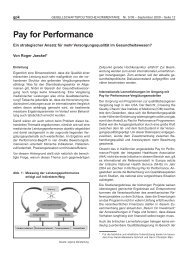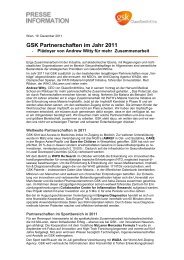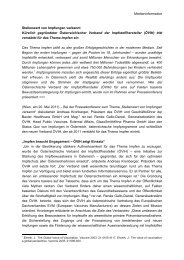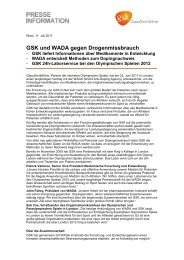WHO Guidelines on Hand Hygiene in Health Care - Safe Care ...
WHO Guidelines on Hand Hygiene in Health Care - Safe Care ...
WHO Guidelines on Hand Hygiene in Health Care - Safe Care ...
Create successful ePaper yourself
Turn your PDF publications into a flip-book with our unique Google optimized e-Paper software.
PART I. REVIEW OF SCIENTIFIC DATA RELATED TO HAND HYGIENE<br />
17.1 Importance of hand hygiene <strong>in</strong> different religi<strong>on</strong>s<br />
Pers<strong>on</strong>al hygiene is a key comp<strong>on</strong>ent of human well-be<strong>in</strong>g<br />
regardless of religi<strong>on</strong>, culture or place of orig<strong>in</strong>. Human healthrelated<br />
behaviour, however, results from the <strong>in</strong>fluence of multiple<br />
factors affected by the envir<strong>on</strong>ment, educati<strong>on</strong>, and culture.<br />
Accord<strong>in</strong>g to behavioural theories 725,767 (see Part I, Secti<strong>on</strong> 18),<br />
hand cleans<strong>in</strong>g patterns are most likely to be established <strong>in</strong><br />
the first 10 years of life. This impr<strong>in</strong>t<strong>in</strong>g subsequently affects<br />
the attitude to hand cleans<strong>in</strong>g throughout life, <strong>in</strong> particular,<br />
regard<strong>in</strong>g the practice called “<strong>in</strong>herent hand hygiene, 725,767<br />
which reflects the <strong>in</strong>st<strong>in</strong>ctive need to remove dirt from the sk<strong>in</strong>.<br />
The attitude to handwash<strong>in</strong>g <strong>in</strong> more specific opportunities is<br />
called “elective handwash<strong>in</strong>g practice” 725 and may much more<br />
frequently corresp<strong>on</strong>d to some of the <strong>in</strong>dicati<strong>on</strong>s for hand<br />
hygiene dur<strong>in</strong>g health-care delivery.<br />
In some populati<strong>on</strong>s, both <strong>in</strong>herent and elective hand hygiene<br />
practices are deeply <strong>in</strong>fluenced by cultural and religious factors.<br />
Even though it is very difficult to establish whether a str<strong>on</strong>g<br />
<strong>in</strong>herent attitude towards hand hygiene directly determ<strong>in</strong>es<br />
an <strong>in</strong>creased elective behaviour, the potential impact of some<br />
religious habits is worth c<strong>on</strong>sider<strong>in</strong>g.<br />
<strong>Hand</strong> hygiene can be practised for hygienic reas<strong>on</strong>s, ritual<br />
reas<strong>on</strong>s dur<strong>in</strong>g religious cerem<strong>on</strong>ies, and symbolic reas<strong>on</strong>s <strong>in</strong><br />
specific everyday life situati<strong>on</strong>s (seeTable I.17.1). Judaism, Islam<br />
and Sikhism, for example, have precise rules for handwash<strong>in</strong>g<br />
<strong>in</strong>cluded <strong>in</strong> the holy texts and this practice punctuates several<br />
crucial moments of the day. Therefore, a serious, practis<strong>in</strong>g<br />
believer is a careful observer of these <strong>in</strong>dicati<strong>on</strong>s, though<br />
it is well known that <strong>in</strong> some cases, such as with Judaism,<br />
religi<strong>on</strong> underlies the very culture of the populati<strong>on</strong> <strong>in</strong> such a<br />
way that the two c<strong>on</strong>cepts become almost <strong>in</strong>dist<strong>in</strong>guishable.<br />
As a c<strong>on</strong>sequence of this, even those who do not c<strong>on</strong>sider<br />
themselves str<strong>on</strong>g believers behave accord<strong>in</strong>g to religious<br />
pr<strong>in</strong>ciples <strong>in</strong> everyday life. However, it is very difficult to establish<br />
if <strong>in</strong>herent 725 and elective 725 behaviour <strong>in</strong> hand hygiene, deepseated<br />
<strong>in</strong> some communities, may <strong>in</strong>fluence HCWs’ attitude<br />
towards hand cleans<strong>in</strong>g dur<strong>in</strong>g health-care delivery. It is likely<br />
that those who are used to car<strong>in</strong>g about hand hygiene <strong>in</strong> their<br />
pers<strong>on</strong>al lives are more likely to be careful <strong>in</strong> their professi<strong>on</strong>al<br />
lives as well, and to c<strong>on</strong>sider hand hygiene as a duty to<br />
guarantee patient safety. For <strong>in</strong>stance, <strong>in</strong> the Sikh culture, hand<br />
hygiene is not <strong>on</strong>ly a holy act, but an essential element of daily<br />
life. Sikhs will always wash their hands properly with soap<br />
and water before dress<strong>in</strong>g a cut or a wound. This behaviour is<br />
obviously expected to be adopted by HCWs dur<strong>in</strong>g patient care.<br />
A natural expectati<strong>on</strong>, such as this <strong>on</strong>e, could also facilitate<br />
patients’ ability to rem<strong>in</strong>d the HCW to clean their hands without<br />
creat<strong>in</strong>g the risk of compromis<strong>in</strong>g their mutual relati<strong>on</strong>ship.<br />
Of the five basic tenets of Islam, observ<strong>in</strong>g regular prayer five<br />
times daily is <strong>on</strong>e of the most important. Pers<strong>on</strong>al cleanl<strong>in</strong>ess<br />
is paramount to worship <strong>in</strong> Islam. 763 Muslims must perform<br />
methodical abluti<strong>on</strong>s before pray<strong>in</strong>g, and clear <strong>in</strong>structi<strong>on</strong>s are<br />
given <strong>in</strong> the Qur’an as to precisely how these should be carried<br />
out. 768 The Prophet Mohammed always urged Muslims to wash<br />
hands frequently and especially after some clearly def<strong>in</strong>ed tasks<br />
(Table I.17.1). 769 Abluti<strong>on</strong>s must be made <strong>in</strong> freely runn<strong>in</strong>g (not<br />
stagnant) water and <strong>in</strong>volve wash<strong>in</strong>g the hands, face, forearms,<br />
ears, nose, mouth and feet, three times each. Additi<strong>on</strong>ally, hair<br />
must be dampened with water. Thus, every observant Muslim<br />
is required to ma<strong>in</strong>ta<strong>in</strong> scrupulous pers<strong>on</strong>al hygiene at five<br />
<strong>in</strong>tervals throughout the day, aside from his/her usual rout<strong>in</strong>e<br />
of bath<strong>in</strong>g as specified <strong>in</strong> the Qur’an. These habits transcend<br />
Muslims of all races, cultures and ages, emphasiz<strong>in</strong>g the<br />
importance ascribed to correct abluti<strong>on</strong>s. 770<br />
With the excepti<strong>on</strong> of the ritual spr<strong>in</strong>kl<strong>in</strong>g of holy water <strong>on</strong><br />
hands before the c<strong>on</strong>secrati<strong>on</strong> of bread and w<strong>in</strong>e, and of the<br />
wash<strong>in</strong>g of hands after touch<strong>in</strong>g the holy oil (the latter <strong>on</strong>ly <strong>in</strong> the<br />
Catholic Church), the Christian faith seems to bel<strong>on</strong>g to the third<br />
category of the above classificati<strong>on</strong> (Table I.17.1) regard<strong>in</strong>g hand<br />
hygiene behaviour. In general, the <strong>in</strong>dicati<strong>on</strong>s given by Christ’s<br />
example refer more to spiritual behaviour, but the emphasis<br />
<strong>on</strong> this specific po<strong>in</strong>t of view does not imply that pers<strong>on</strong>al<br />
hygiene and body care are not important <strong>in</strong> the Christian way<br />
of life. Similarly, there are no specific <strong>in</strong>dicati<strong>on</strong>s regard<strong>in</strong>g<br />
hand hygiene <strong>in</strong> daily life <strong>in</strong> the Buddhist faith, nor dur<strong>in</strong>g ritual<br />
occasi<strong>on</strong>s, apart from the hygienic act of wash<strong>in</strong>g hands after<br />
each meal.<br />
Similarly, specific <strong>in</strong>dicati<strong>on</strong>s regard<strong>in</strong>g hand hygiene are<br />
n<strong>on</strong>existent <strong>in</strong> the Buddhist faith. No menti<strong>on</strong> is made of hand<br />
cleans<strong>in</strong>g <strong>in</strong> everyday life, nor dur<strong>in</strong>g ritual occasi<strong>on</strong>s. Accord<strong>in</strong>g<br />
to Buddhist habits, <strong>on</strong>ly two examples of pour<strong>in</strong>g water over<br />
hands can be given, both with symbolic mean<strong>in</strong>g. The first is the<br />
act of pour<strong>in</strong>g water <strong>on</strong> the hands of the dead before cremati<strong>on</strong><br />
<strong>in</strong> order to dem<strong>on</strong>strate forgiveness to each other, between the<br />
dead and the liv<strong>in</strong>g. The sec<strong>on</strong>d, <strong>on</strong> the occasi<strong>on</strong> of the New<br />
Year, is the young pers<strong>on</strong>’s gesture of pour<strong>in</strong>g some water over<br />
the hands of elders to wish them good health and a l<strong>on</strong>g life.<br />
Culture might also be an <strong>in</strong>fluential factor whatever the religious<br />
background. In certa<strong>in</strong> African countries (e.g. Ghana and<br />
some other West African countries) hand hygiene is comm<strong>on</strong>ly<br />
practised <strong>in</strong> specific situati<strong>on</strong>s of daily life accord<strong>in</strong>g to some<br />
ancient traditi<strong>on</strong>s. For <strong>in</strong>stance, hands must always be washed<br />
before rais<strong>in</strong>g anyth<strong>in</strong>g to <strong>on</strong>e’s lips. In this regard, there is a<br />
local proverb: “when a young pers<strong>on</strong> washes well his hands,<br />
he eats with the elders”. Furthermore, it is customary to provide<br />
facilities for hand aspersi<strong>on</strong> (a bowl of water with special leaves)<br />
outside the house door to welcome visitors and to allow them to<br />
wash their face and hands before even enquir<strong>in</strong>g the purpose of<br />
their visit.<br />
Unfortunately, the above-menti<strong>on</strong>ed hypothesis that community<br />
behaviour <strong>in</strong>fluences HCWs’ professi<strong>on</strong>al behaviour has been<br />
corroborated by scanty scientific evidence until now (see also<br />
Part I, Secti<strong>on</strong> 18). In particular, no data are available <strong>on</strong> the<br />
impact of religious norms <strong>on</strong> hand hygiene compliance <strong>in</strong><br />
health-care sett<strong>in</strong>gs where religi<strong>on</strong> is very deep-seated. This<br />
is a very <strong>in</strong>terest<strong>in</strong>g area for research <strong>in</strong> a global perspective,<br />
because this k<strong>in</strong>d of <strong>in</strong>formati<strong>on</strong> could be very useful to identify<br />
the best comp<strong>on</strong>ents of a programme for hand hygiene<br />
promoti<strong>on</strong>. It could be established that, <strong>in</strong> some c<strong>on</strong>texts,<br />
emphasiz<strong>in</strong>g the l<strong>in</strong>k between religious and health issues may<br />
be very advantageous. Moreover, an assessment survey may<br />
also show that <strong>in</strong> populati<strong>on</strong>s with a high religious observance<br />
of hand hygiene, compliance with hand hygiene <strong>in</strong> health<br />
care will be higher than <strong>in</strong> other sett<strong>in</strong>gs and, therefore, does<br />
not need to be further strengthened or, at least, educati<strong>on</strong><br />
strategies should be oriented towards different aspects of hand<br />
hygiene and patient care.<br />
79















